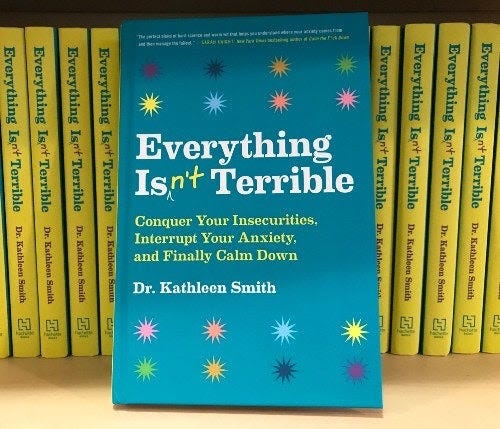Anxious about the holidays? Try watching what people do.
How observing a family changes a family
I wanted to edit and reshare an old Thanksgiving newsletter, because I think it’s useful for anyone spending time with family for the holidays. Enjoy! - K
When your family gathers for a holiday, it’s easy to go on the defensive. Who’s going to ask you intrusive questions? Who’s going to bring up politics and make everyone tense? Who’s going to drink a little too much or offer unsolicited advice?
I ask my clients to put on their researcher hats when they spend time with family. To see these gatherings as laboratories instead of haunted houses. The holidays are an opportunity to observe how the family functions. You cram everyone together, pump them full of carbs, and watch humans do their thing—try very hard to manage the anxiety in the room.
A family is more than a collection of character flaws; it’s an emotional system that uses a set of automatic, predictable strategies to calm things down. The less surprised you are by these strategies, the less people will seem like villains out to get you. They’re just humans trying to manage the intensity of togetherness.
Do you expect to see any of these behaviors at your family gathering?
Turning on the TV to avoid conversation
Using spouse or partner as a buffer
Becoming super helpful to avoid conversation
Offering unsolicited advice
Arriving late or leaving early
Bonding by complaining about the same person
Gossiping about somebody who’s not present
Needing to know everyone’s plans
Needing everyone to do the same activity
Packing the day with activities
Angling for the approval (or disapproval) of others
Sticking to superficial conversation
Playing with kids to avoid grown ups
Using alcohol to calm down
Asking lots of questions so no one can ask them one
Changing the subject when politics or religion are discussed
Looking at their phone
Agreeing with someone just to avoid conflict
Focusing on whether people like their food/gift
Only hanging around people they know the best
Trying to keep someone from embarrassing them
Telling other people how to do things
Not helping because someone else will do it
Avoiding people they find awkward
Only talking about their kid and not themselves
These are all attempts to keep things calm. They are not good or bad, but they have a cost. What’s the cost of always hiding in the bathroom? Of talking exclusively to your favorite uncle? Of not being honest about what you believe or what’s important to you? Of not even showing up? You might miss out on:
Developing stronger one-to-one relationships
Practicing regulating your own anxiety
Learning to be more objective about your family
Learning to think and act for yourself in challenging relationships
What does it look like to lay down these predictable behaviors? To fly without your autopilot? I’ll write more about that next week. But if you take one idea with you to Thanksgiving, or any family gathering, it’s that observation itself changes things. Curiosity lowers anxiety.
One person’s willingness to zoom out, to see a group’s behaviors as adaptive responses to stress, changes the whole ball game. It helps you be more thoughtful, less resentful, and more focused on the one variable you can change: your part in it.
Questions to bring with you:
What are the predictable ways my family manages anxiety when we gather?
How do I participate in these strategies?
How can I focus on observing this year?
Are there different ways of relating to people than my predictable behaviors?
News from Kathleen
I had a wonderful discussion about how we bring our family functioning to the workplace on the Harvard Business Review’s Anxious Achiever podcast.
For Medium’s Forge Mag, I wrote about the trap of trying to make people behave better, and how we end up anxiously attacking our problems rather than approaching them thoughtfully.
Want to support my free newsletter? Buy me a coffee to keep the thoughts flowing.
Want to read more of my writing? You can read old newsletters at my website, or buy my book Everything Isn't Terrible from Amazon, Barnes and Noble, Indiebound, or your local bookstore (best option).
Want a free anxiety journal? Calming Down & Growing Up: A 30 Day Anxiety Journal includes thirty daily prompts to help you reflect on and respond to your anxious behaviors. To receive a copy, just email me your receipt of the book.
Follow me on Twitter, Facebook, or Instagram, or email me if you have questions about Bowen theory coaching or having me speak to your organization or group.
Want to learn more about Bowen theory? Visit the Bowen Center’s website to learn more about their conferences and training programs.





